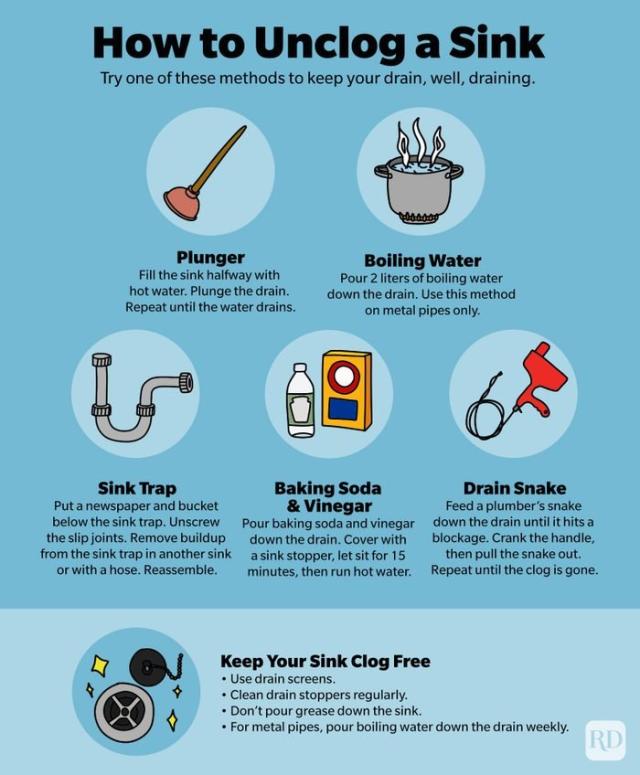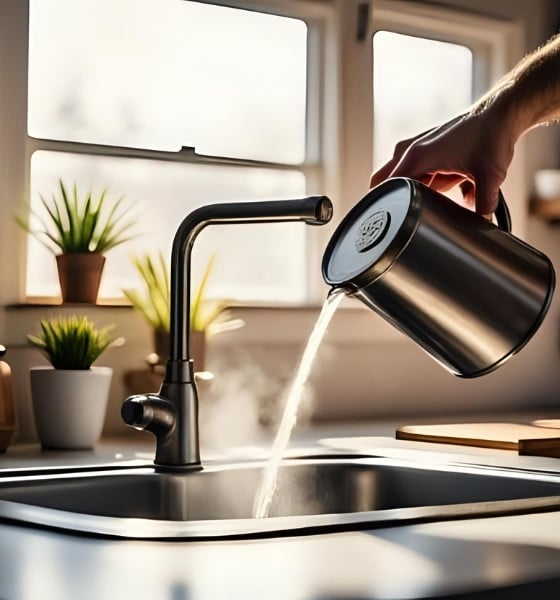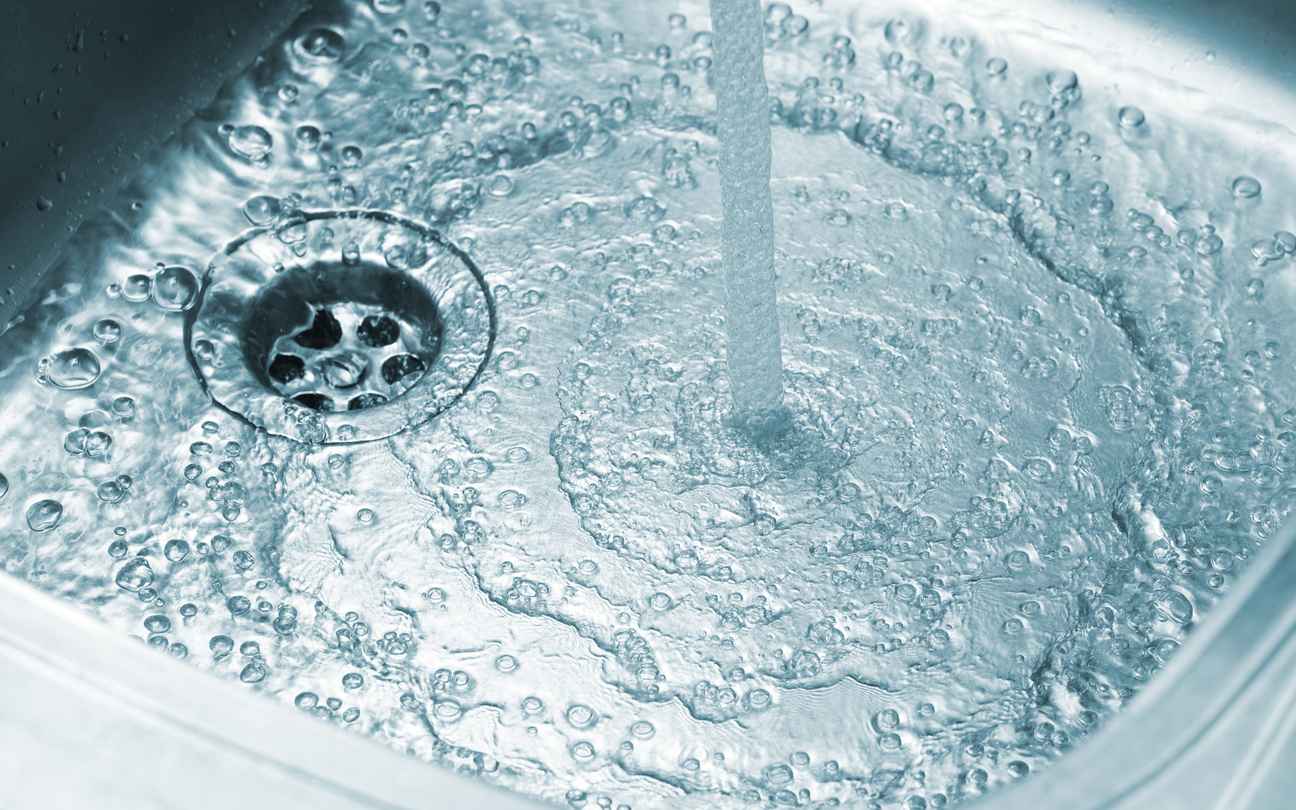Have you ever wondered if pouring boiling water down your kitchen sink is safe? You might think it’s a quick way to clear clogs or clean the drain, but is it really a good idea?
What if this simple action could damage your pipes or cause bigger problems? Keep reading to find out the truth about boiling water and your kitchen sink—and learn how to protect your plumbing while keeping your sink clean.

Credit: www.aol.com
Boiling Water And Sink Materials
Pouring boiling water down your kitchen sink might seem harmless, but the impact depends heavily on what your sink is made of. Different materials handle heat differently, and knowing your sink’s resistance to boiling water can save you from costly repairs or unexpected damage.
Common Kitchen Sink Types
Kitchen sinks come in various materials, each with unique qualities. Here are some of the most popular types:
- Stainless Steel:Durable and resistant to stains, it’s the most common choice in modern kitchens.
- Porcelain or Ceramic:Offers a classic look but can chip or crack under sudden temperature changes.
- Composite Granite:Made from crushed stone and resin, it’s tough but sensitive to extreme heat.
- Cast Iron with Enamel Coating:Heavy and sturdy, but the enamel can crack if exposed to boiling water repeatedly.
- Plastic or Acrylic:Lightweight and affordable, but typically less heat resistant and prone to warping.
Heat Resistance Of Sink Materials
Not all sinks can handle boiling water without damage. Stainless steel sinks generally tolerate boiling water well. The metal quickly disperses heat, reducing the risk of warping or cracking.
Porcelain and ceramic sinks are more fragile. A sudden blast of boiling water can cause cracks or chips, especially if the sink is already worn. Composite granite sinks can endure heat but pouring boiling water directly can weaken the resin over time.
Cast iron sinks with enamel coating can suffer from thermal shock. Repeated exposure to boiling water can cause the enamel to crack or peel off. Plastic or acrylic sinks are the most vulnerable; boiling water can deform or melt the surface.
Have you noticed any discoloration or cracks around your sink’s drain or basin after pouring hot water? That might be a sign to rethink your cleaning methods. Instead of pouring boiling water directly, consider using warm water or waiting for it to cool slightly to protect your sink’s longevity.
Effects Of Boiling Water On Pipes
Pipes in the kitchen sink face different effects from boiling water. The type of pipe material matters most. Some pipes handle heat well, while others can weaken or melt. Knowing these effects helps protect your plumbing.
Impact On Pvc Pipes
PVC pipes are common in many homes. They are made from plastic and have a heat limit. Boiling water can soften PVC pipes. This makes them bend or warp over time. Repeated exposure may cause cracks or leaks. Boiling water can damage pipe joints and seals too. Avoid pouring boiling water directly into PVC pipes. Let water cool slightly before draining.
Impact On Metal Pipes
Metal pipes, like copper or steel, handle heat better. Boiling water usually does not harm metal pipes. These pipes resist high temperatures without warping. However, rapid temperature changes can cause metal to expand and contract. This might loosen pipe connections eventually. Metal pipes are less likely to crack from boiling water. Still, avoid constant exposure to prevent wear over time.
Potential Risks Of Pouring Boiling Water
Pouring boiling water down your kitchen sink might seem like a quick fix for clogged drains or cleaning, but it carries some risks you should consider. Understanding these dangers can help you protect your plumbing and keep yourself safe. Let’s look at the potential problems boiling water can cause.
Pipe Damage And Leaks
Boiling water can seriously damage certain types of pipes, especially if they are old or made from plastic materials like PVC. The extreme heat may soften or warp plastic pipes, leading to cracks or leaks over time.
Metal pipes can also be affected. Sudden exposure to boiling water might cause metal to expand rapidly, increasing the chance of joint loosening or small fractures. Have you noticed a slow drip or wet spots under your sink after using hot water? That could be a warning sign.
If your home has older plumbing, pouring boiling water down the drain could shorten the lifespan of your pipes. Instead, consider safer alternatives like using warm water or natural drain cleaners to avoid costly repairs.
Risk Of Burns And Injuries
Handling boiling water is risky. One slip or splash can cause serious burns to your hands, arms, or even face. Have you ever accidentally spilled hot water in the kitchen? It’s painful and can lead to lasting injuries.
Pouring boiling water into a sink with standing water can cause splashing, increasing the chance of burns. You might think you’re doing something helpful, but are you putting yourself at risk?
Always protect yourself with thick gloves and pour water slowly if you must use boiling water. Taking these precautions can save you from painful accidents that are all too common in the kitchen.
Safe Practices For Using Hot Water In Sinks
Pouring boiling water down the kitchen sink can damage pipes and seals. Use hot, but not boiling, water to protect plumbing and avoid leaks. Always pour slowly to prevent sudden temperature changes that may cause cracks.
Pouring boiling water down your kitchen sink might seem like a quick fix for clogs and grease buildup, but is it really the best practice? Understanding the safe use of hot water in your sink can protect your plumbing and save you from costly repairs. Let’s explore some safe practices to ensure you’re not inadvertently damaging your pipes.Temperature Guidelines
It’s essential to know the temperature limits your pipes can handle. Most household plumbing is made from PVC, which can warp or crack under high temperatures. Ideally, water should not exceed 140°F (60°C) to avoid damaging your pipes. Using warm or hot water within this range is usually safe for regular cleaning tasks. If your pipes are older or made from materials like PVC, staying on the lower end of this range is best.Alternatives To Boiling Water
There are safer alternatives to pouring boiling water down your sink. One effective method is to use a mixture of baking soda and vinegar to clean and deodorize your pipes. Simply pour half a cup of baking soda followed by a cup of vinegar, then let it sit for about 15 minutes before flushing with warm water. Another option is using enzymatic drain cleaners, which are designed to break down organic material without the need for extreme heat. These are particularly useful for maintaining clear and odor-free pipes. Have you ever considered these alternatives? They might save you from a plumbing disaster. Always consider the impact of your actions and prioritize the longevity of your plumbing system.When To Avoid Pouring Boiling Water
Knowing when to avoid pouring boiling water down your kitchen sink can save you from costly repairs and unexpected plumbing issues. Boiling water might seem like a quick fix for clearing minor blockages, but in certain situations, it can do more harm than good. Understanding these scenarios helps you protect your plumbing and maintain a smoothly running kitchen.
Clogged Drains
Pouring boiling water down a clogged drain can sometimes worsen the problem. If your drain is blocked by grease or fat, hot water may melt the substance temporarily, but as it cools, the fat can solidify further down the pipe and cause a bigger clog.
Instead, try using a baking soda and vinegar mixture to break down the blockage gently. Have you noticed your sink draining slower after pouring boiling water? That might be a sign to rethink your approach.
Older Plumbing Systems
Older plumbing pipes are often made from materials that can be damaged by extreme heat. Pouring boiling water into these pipes risks cracking or weakening them, leading to leaks and costly repairs.
Materials like PVC are especially vulnerable to high temperatures. If your home has aging pipes, consider using warm water or other safe cleaning methods. How old is your plumbing system? Checking this can help you decide if boiling water is safe to use.

Credit: plumbingandelectrical.net.au
Tips For Maintaining Kitchen Sink Health
Maintaining a healthy kitchen sink is key to avoiding plumbing issues. Simple habits keep your sink clean and working well. Avoid harsh chemicals that can damage pipes and the environment. Use easy, safe methods to keep drains clear and fresh. Consistency matters to prevent buildup and blockages over time.
Regular Cleaning Methods
Clean your sink daily to stop grime and food scraps from piling up. Use a soft sponge and mild dish soap to wipe all surfaces. Rinse thoroughly with warm water after washing. For a deeper clean, sprinkle baking soda on the sink, scrub gently, then pour vinegar to fizz and break down dirt. Rinse again with warm water.
Clean the drain area regularly by removing the stopper and clearing trapped debris. Avoid pouring grease or oil down the drain as they harden and cause clogs. Wipe greasy pans with paper towels before washing.
Preventing Clogs Safely
Use a drain strainer to catch food particles and prevent them from entering pipes. Empty it into the trash after each use. Flush the drain weekly with boiling water to help dissolve soap and grease buildup. Avoid pouring boiling water if you have PVC pipes, as it may soften them.
Use natural cleaners like baking soda and vinegar instead of chemical drain cleaners. These are safer for your pipes and the environment. Schedule regular checks for slow drains or strange smells. Early action can stop bigger problems.

Credit: licketysplitfl.com
Frequently Asked Questions
Is It Safe To Pour Boiling Water Down The Kitchen Sink?
Pouring boiling water down a kitchen sink is generally safe for metal pipes. However, avoid doing this with PVC pipes, as the heat can cause damage or warping.
Can Boiling Water Unclog Kitchen Sink Drains?
Yes, boiling water can help dissolve grease and soap buildup, aiding in unclogging minor kitchen sink blockages efficiently and naturally.
Will Boiling Water Damage Kitchen Sink Pipes?
Boiling water may damage plastic or PVC pipes by softening or warping them, but it usually won’t harm metal or stainless steel pipes.
How Often Can I Pour Boiling Water Down The Sink?
Use boiling water sparingly, only a few times a month. Frequent use may weaken plastic pipes and cause leaks over time.
Conclusion
Pouring boiling water down the kitchen sink can be safe sometimes. It helps clear grease or minor clogs. Yet, it may harm some pipes, especially plastic ones. Avoid doing it often to protect your plumbing. Use warm water for regular cleaning instead.
Know your pipe type before pouring hot water. Take care of your sink to avoid costly repairs. Small habits make a big difference in home care. Keep your kitchen sink running smoothly and safely.







